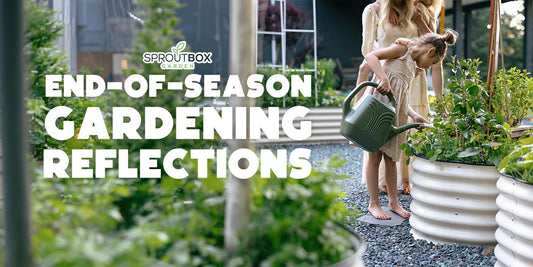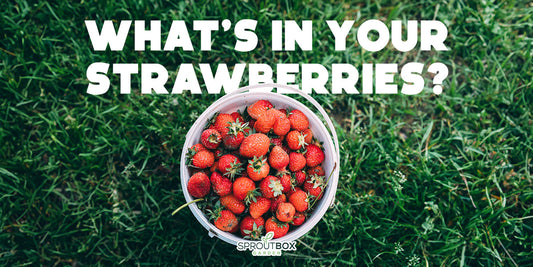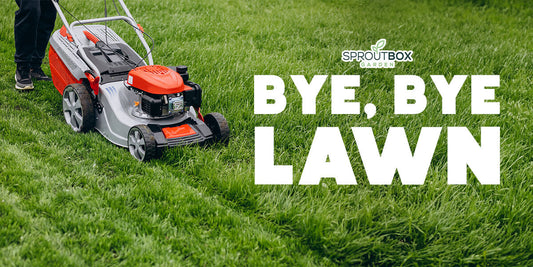Growing for a Year-Round Harvests: A Beginner’s Guide to Seasonal Gardening.

Growing your own veggies at home is an easy way to have a healthier organic diet at a fraction of grocery store prices. But in Canada, because of our weather, it seems like we’re doomed to spend the big bucks between October and March.
But what if you could have a thriving garden all year round? Turns out, with just a bit of planning and effort, you can create a garden that produces fresh, healthy, and delicious vegetables throughout the year.
In this guide, we'll show you how to plan and design a raised bed garden that can withstand Canada's ever-changing weather conditions. We'll share tips on crop rotation, seasonal planting, and garden preparation, so you can enjoy a bountiful harvest all year round. Whether you're a beginner gardener or a seasoned pro, this guide has something for everyone.
Planning
First things first. If we’re going to fight against our famous winters in order to get fresh produce, no matter the season, we’ll need the right weapons. And one of the most powerful tools you can have in this battle is a gardening notebook.
Get yourself a notepad that can help you do all the planning you need to face the challenge. From crop rotation, to fertilizing schedules, to seeding and harvesting timelines…. Not only will this help you garden with it gets cold outside, but it will also guarantee the best results over the summer.
A little gardening journal can be the key to having harvests that feed your family, and your neighbours, and your friends, and your kid’s school teacher, and the folks at church and… A big harvest. 😂
Choosing the right plants
When it comes to selecting plants for your garden, it's important to choose ones that will thrive in your local climate and soil conditions. Canada has diverse climates ranging from temperate to subarctic, so the plants that grow well in one region may not do as well in another. It's a good idea to do some research and consult with local gardening experts to determine which plants are best suited for your area.
In addition to choosing plants that are well-suited for your region, you'll also want to consider the specific growing conditions in your garden. For example, if you have a shady spot, you'll want to choose plants that can tolerate lower light levels, such as leafy greens like lettuce or arugula. If you have a sunny spot, you may want to plant heat-loving crops like tomatoes or peppers.
When planning your garden, it's also important to think about crop rotation. Crop rotation involves planting different families of plants in different areas of your garden each year. This helps to prevent the build-up of soil-borne diseases and pests that can affect certain plant families. For example, if you grew tomatoes in one raised bed last year, it's best to plant a different family of plants in that bed this year, such as legumes like peas or beans.
Here are some popular vegetable crops that can be grown year-round in Canada:
- Leafy greens: spinach, lettuce, kale, chard, arugula, and mustard greens can be grown in both spring and fall.
- Root vegetables: carrots, beets, potatoes, and radishes can be planted in the fall and harvested in winter.
- Brassicas: broccoli, cauliflower, and cabbage are great options for fall planting and winter harvesting.
- Alliums: onions, garlic, and shallots can be planted in the fall and harvested the following summer.
- Legumes: peas and beans are good options for spring planting.
With a little research and planning, you can choose a variety of vegetables that will provide you with fresh produce all year round.
Protect your garden
To extend your growing season and protect your plants from frost, use row covers, cloches, or cold frames. Row covers and cloches are lightweight materials that can be placed over your plants to protect them from the cold. Cold frames are mini-greenhouses that can be used to start seeds early in the season and extend the growing season.
Maintain your garden
Winter maintenance is crucial to ensure that your garden is healthy and productive when the growing season returns. In addition to protecting your plants from the harsh winter elements, there are a few other key tasks that you should consider to maintain your garden over the winter.
First, you'll want to regularly inspect your garden for any signs of pests or diseases. During the winter months, pests like rodents may try to seek refuge in your garden, and diseases like powdery mildew can still be present on plants. Regularly inspecting your garden will help you catch any issues early and take appropriate action.
Another important task is to keep your soil healthy. During the winter, soil can become compacted and lose important nutrients. One way to combat this is to add organic matter to your garden beds. This can include items like compost, leaves, or straw. The organic matter will break down over time and help to improve soil structure and nutrient availability.
Finally, it's important to continue watering your garden throughout the winter. While plants may not need as much water as they do during the growing season, they still require some moisture to survive. Be sure to monitor the moisture levels in your garden and water as needed. Avoid watering when the temperature is below freezing, as this can cause damage to your plants.
Take your garden to the next level
In conclusion, creating a year-round garden that provides a bounty of fresh produce can be a fun and rewarding experience. By following the steps outlined in this article, you can ensure that your garden is healthy and productive all year round, regardless of the weather.
Remember to plan ahead, choose the right plants for each season, and protect your garden from the elements. And don't forget to maintain your garden throughout the winter months by inspecting for pests and diseases, adding organic matter to your soil, and monitoring moisture levels.
Having the right raised garden bed will go a long way when gardening all through the year. That’s why it’s important you have the best. Sproutbox Garden raised beds are built to last up to 20 years. So no matter how harsh the season is, you’ll always be able to have a food-safe controlled environment to guarantee your plants grow healthier and happier.
Not to mention, you won’t ever have to deal with rats or other pests chewing through them over the winter!
Click here to check out all Sproutbox Garden metal raised beds.



